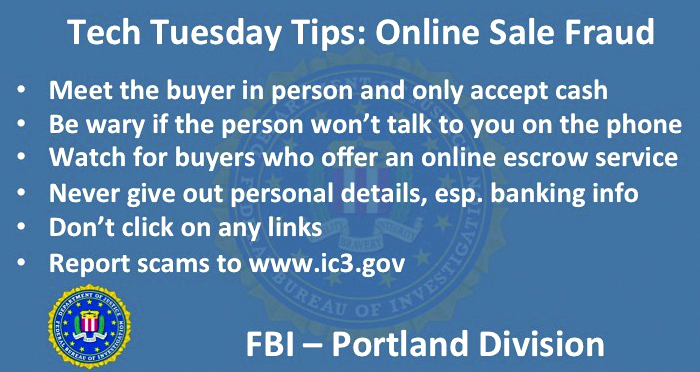Last week we talked about how to avoid being scammed by overpayment fraud schemes while trying to sell items on sites such as Craigslist and Facebook. This week – some other common frauds that can come with launching virtual garage sales.
Using platforms like these are easy, and they can generate some extra cash for you and your family. But, fraudsters also know how to take advantage of your good will.
I recently posted some items online and almost immediately started receiving suspicious texts and emails. They often included bad spellings, bad grammar, lots of extra capital letters or text just cut-and-pasted from my online ad.
One, though, was a bit different. This person texted me from an out-of-state number with a request to email him back. He didn’t even mention the item I was selling – just a generic request about my “appliance.” This is a perfect set-up for an unsuspecting seller to click on the email link. The fraudster may be “phishing” – sending out thousands of such non-specific texts hoping to get a few people to respond. Clicking on that link could download malware onto my phone or computer – or it could give the fraudster a heads-up that I am a willing victim. He could then try to lure me into an overpayment or non-payment scam, wire or credit card fraud, or ID theft situation.
In other situations, a fraudster may send you an official-looking, but fake, email from what purports to be a third-party company offering to guarantee that the sale is legit. Don’t fall for it. Transactions should happen directly between the seller and the buyer when you are dealing in these forums. Don’t count on anyone else to guarantee the sale.
Other warning signs to watch for:
⦁ Don’t accept or send money via wire transfer. Same thing goes for cashier’s checks and money orders. Cash is best.
⦁ Don’t deal with people who live out-of-town or people who require shippers or movers. Deals should happen face-to-face. For your own personal safety, consider making the deal in a public place – such as outside a police station – when possible.
⦁ Be concerned if the buyer won’t talk to you on the phone. Most scammers prefer text and email.
⦁ Watch for buyers who offer an online escrow service. Don’t do it. Again, meet in person and deal in cash.
⦁ Never give out personal details, including bank or PayPal account information.
⦁ Don’t click on links, even if the link appears to go back to your own listing.
Remember – if the deal seems too easy, too fast and too good to pass up – it is probably a scam.
If you have been victimized by an online scam or any other cyber fraud, be sure to report it to the FBI’s Internet Crime Complaint Center at www.ic3.gov or call your local FBI office.




